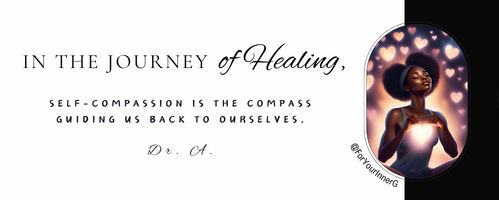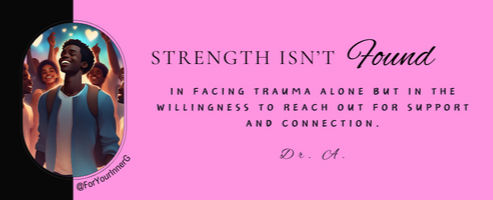Healing from Childhood Trauma: Practical Strategies for Connection and Resilience
- For Your Inner G
- Mar 13, 2024
- 8 min read
Updated: Apr 21, 2025
Experiencing anxiety when entering new environments or trying to connect with others is a natural and common occurrence. It can be even more challenging if you've experienced trauma in the past. You may feel hesitant to express your true self or trust others enough to get to know you. However, it's important to remember that fear can hold you back from pursuing future opportunities. If you let past experiences immobilize you, it may be difficult to find a community that appreciates and accepts you for who you are

This post may contain affiliate links, which means I'll receive a commission if you purchase through my link, at no extra cost to you.
To overcome these challenges, it's essential to work on overcoming your fears. Here are practical strategies that can help you navigate through these emotions, so you may heal your fear and connect with others in a meaningful way.
Recognize Your Worth
If you're struggling with a fear of connecting with others, it's important to take the first step of recognizing your worth and value as an individual. This can be especially difficult if you've experienced trauma or negative experiences in the past that may have left you feeling unworthy or unlovable. However, it's important to remind yourself that you deserve love, support, and a sense of belonging, regardless of what you've been through.
One way to do this is to focus on your positive qualities and strengths. Think about the things you're good at, the things you enjoy, and the things that make you unique. Recognize that these qualities make you who you are. You are valuable and deserving of recognition.
It's also important to remember that your trauma does not define you. While it may have had a significant impact on your life, it does not have to define your worth or your ability to connect with others. Remind yourself that you are capable of forming meaningful connections with others and you deserve to have supportive and positive relationships in your life.
Ultimately, overcoming a fear of connecting with others requires a shift in your mindset. Rather than focusing on your fears and past experiences, try to focus on your positive qualities and the potential for positive connections with others. With time and effort, you can learn to overcome your fears and form meaningful relationships that bring joy and fulfillment into your life.
Practice Self Compassion
Healing from childhood trauma can be a challenging and painful process. It's important to be kind to yourself as you work through it. Practicing self-compassion involves treating yourself with understanding, empathy, and kindness, just as you would treat a friend who is struggling. Acknowledge your emotions and feelings, give yourself permission to rest and take breaks when needed, and remind yourself that you are doing the best you can.
Healing is not a linear process. It's okay to take things one step at a time. You might feel like you are making progress one day and then take a step back the next. That's perfectly normal. Be patient and compassionate with yourself throughout this journey.
Seeking the support of a therapist or counselor can help navigate the challenges of healing from childhood trauma. They can provide a safe and non-judgmental space for you to process your emotions and experiences, offering guidance and tools to help you cope and heal.
Connect with Your Faith
It's natural to seek comfort and guidance from something greater than yourself. If you're someone who finds peace in spiritual beliefs, it can be helpful to lean into the love of God during times of difficulty.
Set aside some time for prayer, meditation, or quiet reflection. This can be as simple as finding a quiet space where you won't be disturbed and taking a few deep breaths to clear your mind. From there, you can focus on connecting with your faith in whatever way feels most natural to you.
In the darkest moments, I've found solace in my faith. Knowing that I'm never truly alone gives me the courage to face whatever comes my way. - Justin Bieber
Whether stating a prayer, reciting a mantra, visualizing a calming image, or simply focusing on your breath, the goal is to connect with your spiritual beliefs and draw strength and comfort from them. Remember, you are not alone. There is always a higher power guiding you through your healing journey. Lean into the presence of the divine, allowing God to assist you in healing, overcoming, and moving forward.
It may also be helpful to seek support from others who share your faith. This can include attending religious services, joining a prayer group or meditation circle, or simply talking with friends or family members who understand and respect your beliefs.
Whatever your path to spiritual healing, remember that it is a deeply personal journey that requires time, patience, and compassion. Trust in your beliefs and the powerful love of God to guide you through even the most difficult of times.
In the chaos of life, mindfulness becomes our sanctuary. It's where we connect with our faith, grounding ourselves in the present moment and trusting in the divine plan. - Jay Shetty
Explore Mindfulness Techniques
Mindfulness techniques can help you stay grounded and present in your daily life. They are designed to keep you focused on the present moment rather than worrying about the past or future. As a result, they can reduce feelings of anxiety and isolation, helping you feel more connected to yourself and the world around you.
One of the most effective mindfulness techniques is deep breathing exercises. These exercises involve taking slow, deep breaths and focusing on the sensation of air moving in and out of your body. This can help to calm your mind and body, reduce stress, and promote relaxation.
Guided meditation is another technique that can help you stay present and focused. During guided meditation, you listen to a recording that guides you through a series of steps designed to help you relax and become more mindful. This can be done in person or through various apps available on your phone.
Finally, body scans are a technique that involves focusing your attention on each part of your body, one at a time. This can help you become more aware of any areas of tension or discomfort, and help you release that tension. Body scans can be done in person or through various apps available on your phone.
By practicing mindfulness techniques regularly, you can become more aware of your thoughts and emotions, allowing you to navigate through difficult experiences with greater ease. You may also feel more connected to yourself and others, experiencing greater joy and contentment in your daily life.
Healing isn't about pretending the pain never existed; it's about finding the courage to face it and grow from it." - Emma Chamberlain
Seek Support from Trusted Individuals
When you experience trauma, it can be challenging to cope with the emotions and memories that come with it. However, seeking support from trusted individuals can be a significant step towards healing. Whether it's a close friend, a family member, or a mentor, reaching out and sharing your experiences with them can help you process your emotions and come to terms with the trauma you've faced.
It's important to remember that opening up to others about your trauma is a personal decision, and you should only do so when you feel ready and comfortable. When you decide to talk about your experiences with someone, choose someone you trust and who will listen without judgment. You might find it helpful to start the conversation by expressing your feelings and emotions and gradually sharing more details as you become more comfortable.
Receiving support from others can be an essential part of the healing process. It can help you feel less alone and provide you with a sense of validation that what you're experiencing is real. Your loved ones can offer you comfort, encouragement, and positive reinforcement, which can help you build self-esteem and confidence.
Remember, it's okay to take your time. Seek support at your own pace. Healing from trauma is a journey, and it's essential to be kind and patient with yourself along the way. With the help of supportive individuals, you can overcome the challenges of trauma and move towards a brighter, more fulfilling future.
Connection is our lifeline. Even in the darkest moments, reaching out for support can be the light that guides us through. - Bretman Rock
Set Boundaries
Creating boundaries with others is an important aspect of taking care of your mental and emotional well-being. It's crucial to set limits on what you will and won't tolerate from others, especially in situations where your boundaries are being crossed. Establishing boundaries helps you communicate your needs with clarity and assertiveness, which in turn helps you to feel more in control of your life.
When it comes to sharing personal information, it's essential to be selective about who you trust. Open up to those you feel comfortable around and believe will respect your privacy. Be mindful that not everyone is trustworthy. Sharing too much too soon can put you in a vulnerable position.
Remember, it's okay to say no when a situation or person makes you feel uncomfortable or triggered. It's essential to listen to your instincts and prioritize your emotional and mental safety. By setting boundaries, you can enhance your relationships with others, improve your self-esteem, and promote your overall well-being.
Remember, your worth isn't determined by the validation of others. You deserve love and support, even on the toughest days. - Charli D'Amelio
Seek Professional Help If Needed
If you find yourself struggling to cope with the effects of childhood trauma, don't hesitate to seek professional help. A spiritual advisor, therapist, or counselor can provide the support and guidance you need to navigate through your healing journey. Seeking help is a sign of strength, not weakness, and you deserve to receive the support you need to heal.
In conclusion, navigating solo after experiencing childhood trauma can be challenging, but it's important to remember that you are not alone. Begin to heal and connect with others in a meaningful way by recognizing your worth, practicing self-compassion, connecting with your faith, and incorporating the other practical steps to overcome your fears.
Break free from the chains of isolation and form deeper connections with others. Remember that you are worthy of love and belonging. Keep moving forward on your healing journey, one step at a time.
Disclaimer: This article is for informational purposes only and is not a substitute for professional medical advice, diagnosis, or treatment. Always seek the advice of your physician or other qualified health provider with any questions you may have regarding a medical condition.
Want to Go Deeper?
Join The Inner G Collective and access exclusive tools to support your journey.
✨ Need more support on your journey?
Explore our healing + growth tools—mindfulness journals, affirmation cards, and poetic guides—each crafted to help you stay grounded, inspired, and emotionally well.
These aren’t just products. They’re soul tools—for the version of you that’s ready to thrive.
🌀 Stay close.
Subscribe to A Gym for the Mind for insights, reflection prompts, and resources that meet you right where you are.
Amirah B. Abdullah, DrPH
Founder of For Your Inner G | Writer + Wellness Educator
Dr. Amirah is a mindset and emotional wellness guide helping ambitious souls shift perspective, deepen self-awareness, and heal with intention. Through her blog, A Gym for the Mind, she shares poetic reflections, grounded strategies, and soulful truths to support your personal growth journey.
Meet Dr. Amirah | Explore Tools for Growth
©For Your Inner G - All Rights Reserved










